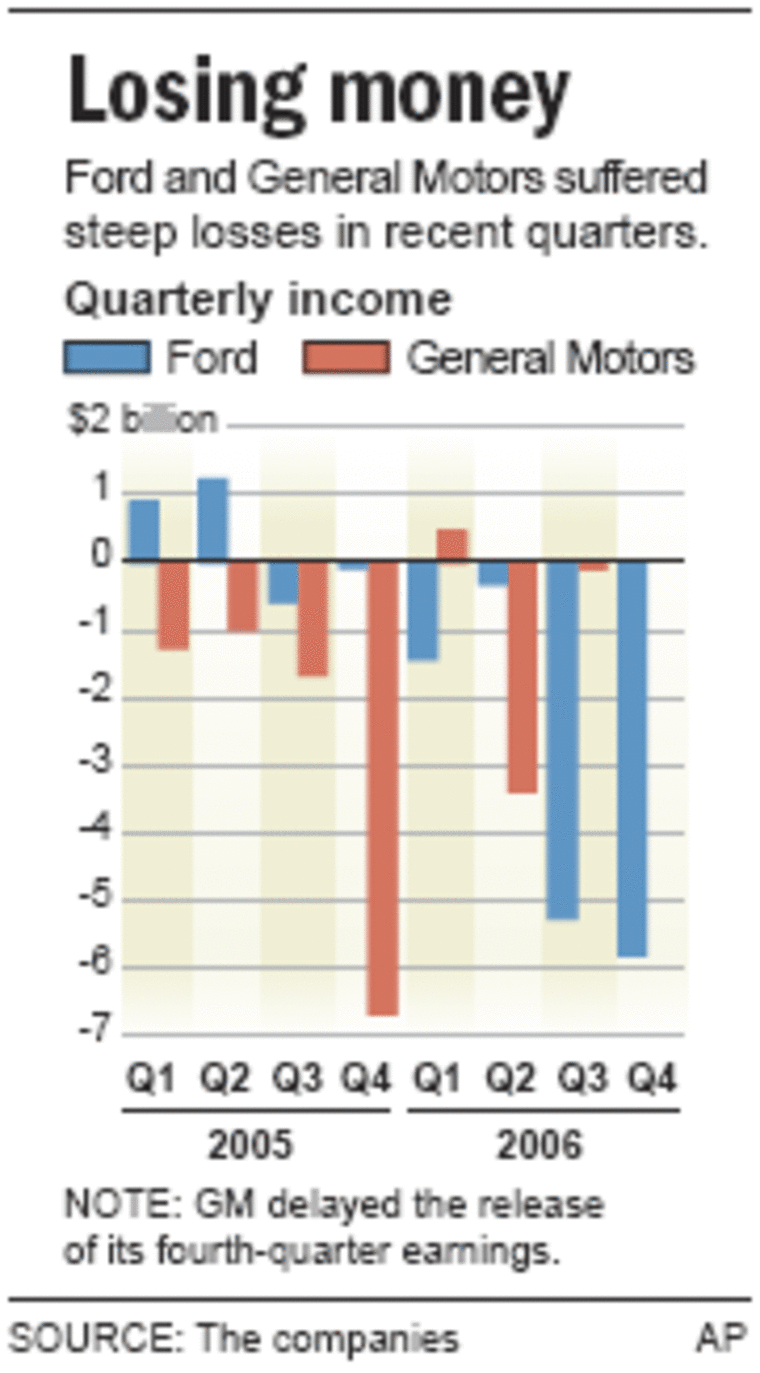GM says it will make money in the fourth quarter after nearly two years of dismal numbers. Ford posts the worst annual loss in its 103-year history.
Despite the disparity in profits, the tale of the nation’s two largest automakers essentially is the same. High labor costs. Over-reliance on trucks and sport utility vehicles for profits. Few cars that people want to buy. And don’t forget Toyota Motor Corp., which on Friday announced that global production last year surged 10 percent, bringing it just inches away from edging out GM as the world’s No. 1 automaker.
The essential difference between Ford and GM, according to some industry analysts, is that GM went into the tank first and is ahead in the restructuring game.
“I consider Ford to be in crisis and GM to be in transition,” said Gerald Meyers, a former chairman of American Motors Corp. who now teaches leadership at the University of Michigan. “The future is not clear yet at General Motors. There is a future. It’s just a matter of how much and when, and that’s a big step ahead of Ford.”
GM hit the bottom with a $10.6 billion loss in 2005. Through three quarters of last year it lost $3 billion, but says it will make money in the fourth quarter. The company is restating retained earnings for 2006, but says that’s just part of an effort to fix the accounting problems that are forcing it to restate earnings for every year after 2001.

GM used 2006 to restructure, getting more than 34,000 production workers to take buyouts or early retirement offers and cutting its structural costs by $9 billion on an annual basis. It also rolled out new pickup trucks and cars.
Ford is following GM’s formula but is about a year behind, said Burnham Securities analyst David Healy.
New Chief Executive Alan Mulally, hired late last year from aerospace giant Boeing Co., says the company is on track toward turning a profit in 2009, and he’s confident in its new products.
But the Dearborn-based company doesn’t have the momentum that GM has, said Rebecca Lindland, an auto analyst at Global Insight, an economic research and consulting company.
“The biggest difference is GM is on track. They have a mission. When I talk to the people there, when you see the products, you get a feeling of confidence and empowerment,” she said. “With Ford, all we hear about is conflict, turmoil, uncertainty. Internally this is at all levels.”
Throughout its 103-year history, Ford has relied to a large degree on a single product to carry the company — from the Model T to the 1960s Mustang to the 1980s Taurus and recently the Explorer SUV and F-series pickups, Meyers said.
GM, however, has placed entries in all market segments, trying to be respectable in all of them to make money.
With so many Asian and European competitors in the marketplace, Ford’s business model might not work anymore, Meyers said. Even if it did, he and others see no hits among Ford’s offerings.
Ford’s mid-sized Fusion and its Lincoln and Mercury counterparts are selling pretty well and the company says its car sales are up 5 percent year over year, but many analysts don’t think that’s enough.
“I don’t think there’s anything coming down the pike that’s going to save the company near term,” said Bruce Clark, a senior vice president with Moody’s.
Ford mortgaged its factories to borrow up to $23.4 billion to pay for its restructuring and to cover losses expected until 2009. About 38,000 hourly workers have signed up for buyout or early retirement offers, and Ford plans to cut its white-collar work force by 14,000 with buyouts and early retirements.
The company finished 2006 with $33.9 billion in cash available for its automotive operations, including $12 billion that it borrowed in December.
But analysts say it’s an open question as to whether Ford can turn itself around before it runs out of cash.
“The answer to that question will be determined by how successful they implement their restructuring,” Clark said. “They’ve given themselves a big cushion, but that doesn’t mean they don’t have problems.”